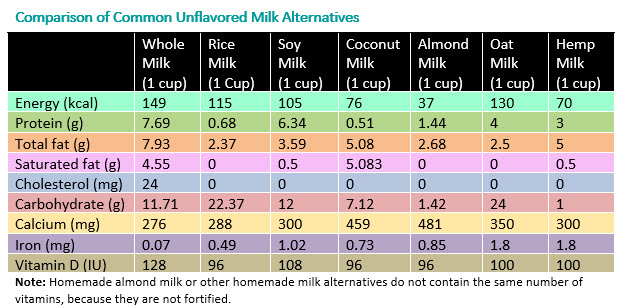What to Give Baby Instead of Cow Milk
By: Anthony Porto, Dr., MPH, FAAP & Rachel Drake, MS, RD, CSO, CSP, CDN
Milk is a grocery list staple for many families. Only, many infants and children are allergic to milk protein or unable to assimilate the sugar in cow'south milk. Some avoid it for other health concerns—or simply considering they don't like the taste. These families can choose from a growing array of cow's milk alternatives that now fill the dairy alley.
The nutritional content in the various dairy alternative products is of import for parents to be enlightened of when shopping. Choices range from other animal-based beverages (e.g., goat's milk) to products fabricated from nuts (e.g., almond milk), beans (east.g., soy milk), grains, and other plants.
The American Academy of Pediatrics (AAP) knows that deciding what's best for your family can be confusing. To assist you sort it all out, here are frequently asked questions from parents nigh cow'due south milk alternatives.
When do I introduce cow's milk into my baby'southward nutrition?
The AAP recommends breastmilk as the sole source of diet for your baby for most the get-go six months. If a baby is breastfed by a female parent who is drinking cow's milk, or is formula fed with traditional infant formula, he or she has already been exposed to cow's milk protein. Near babies can begin consuming dairy foods around vi months of historic period — later on a few starting time solid foods take been introduced. Apparently, whole-fat or whole Greek yogurt is a adept starting time form of cow's milk protein for babies to attempt. Avoid the added carbohydrate ordinarily found in yogurt marketed to babies and toddlers.
One time a baby is developmentally able to consume finger foods, other dairy — such as pieces of cheese — can be added. The AAP recommends that whole moo-cow's milk and low-iron formulas not exist used during the first year of life, because babies' digestive systems under age 1 may non tolerate the cow'due south milk protein in big quantities. Depression-fe formulas can also lead to anemia. Note: Low-iron formulas are no longer marketed routinely in the United states of america.
What if my baby is allergic to cow's milk?
If your formula-fed baby has a cow's milk allergy, inquire your pediatrician about switching to a non-cow'southward milk, protein-based formula. Hypoallergenic formulas are cow'south milk based; only soy formulas are not. Discuss these options with your child's pediatrician before switching.
According to a study published in Pediatrics, at that place is non plenty prove for breastfeeding mothers to routinely avoid allergenic foods—like moo-cow's milk—while breastfeeding.
If your pediatrician diagnoses your baby with a cow's milk protein allergy, then he or she may recommend you lot remove moo-cow's milk from your diet while breastfeeding. Exist aware that it tin can accept several weeks for the milk poly peptide to disappear entirely. The AAP does not currently take an official recommendation on this issue.
Afterward your baby's first altogether, he or she may begin using cow'south milk alternatives or occasionally modify to a toddler version of the formulas mentioned above.
What kinds of cow'south milk alternatives are bachelor?
While soy milk has traditionally been the virtually ordinarily used cow'south milk alternative, there are many options available. Use of tree nut milk, including almond and cashew milks, have become increasingly popular. Rice and oat milk, likewise equally hemp milk, are also possible alternatives. Some of these alternatives are flavored, for example with chocolate and vanilla, all the same these contain added carbohydrate and calories.
What are the differences among cow's milk alternatives?
Moo-cow'southward milk alternatives oftentimes contain less poly peptide and less calories in comparison to cow'southward milk. Most are fortified with vitamin D and calcium. Information technology is important to bank check labels since protein and vitamin content may differ among brands. Run into the nautical chart for a comparing of common unflavored milk alternatives.

How much dairy is recommended for my kid?
Infants' diets primarily consist of dairy to help them meet their caloric needs for growth. In addition, dairy provides plenty fat needed for brain and center development.
-
At one yr, babies should eat approximately two servings of dairy per day, or about 16 to a maximum of 24 ounces of whole milk per solar day. Whole-fat milk is recommended for children at this age, unless there is a family history or risk for obesity or heart illness. Talk with your child's pediatrician about which milk he or she recommends for your one-year-old child.
-
Between two and three years old, children should swallow two.5 servings of dairy per day. The AAP recommends that children stay on whole milk until they are two years of historic period — unless at that place is a reason to switch to depression-fat milk sooner. Whole milk contains approximately four% milk fat. It may aid to gradually switch your child from whole milk to a lower-fat milk. Therefore, many pediatricians recommend that children get reduced fat (2%) milk for a few weeks before switching them to low fat (1%) or no fat (skim) milk. If children cannot drink cow's milk, they can meet their dairy requirements by eating yogurt and cheese, only vitamin D may be needed as a supplement since not all yogurts are fully supplemented with vitamin D. Talk with your child pediatrician before giving your child whatever supplements.
How much calcium and vitamin D are recommended for my child to eat each day?
The specific amount is based on your kid'southward age. Here is a breakup of the recommended dietary allowances (RDA) for calcium and vitamin D.

Boosted Information & Resource:
-
Infant Allergies and Nutrient Sensitivities
-
Why Formula Instead of Cow'southward Milk?
-
Where We Stand up: Soy Formulas
-
Choosing a Formula
-
Lactose Intolerance in Infants & Children: Parent FAQs
-
Enquire the Pediatrician: My preschooler refuses to drink milk. What should we do?
-
The Use of Soy Protein-Based Formulas in Infant Feeding (AAP Policy Statement)
Almost Dr. Porto:
 Anthony Porto, MD, MPH, FAAP is a lath-certified pediatrician and board certified pediatric gastroenterologist. He is an Associate Professor of Pediatrics and Associate Clinical Chief of Pediatric Gastroenterology at Yale University and Manager, Pediatric Gastroenterology at Greenwich Infirmary in Greenwich, CT. He is also the medical director of the Yale Pediatric Celiac Program. Within the American Academy of Pediatrics, Dr. Porto sits on the PREP Gastroenterology Advisory Board and is a member of the Section on Gastroenterology, Hepatology and Nutrition. He is also a member of the North American Order of Pediatric Gastroenterology, Hepatology and Nutrition's Public Instruction Committee, a pediatric adept on diet for The Crash-land'southwardReal Answers, and is the co-writer ofThe Pediatrician'southward Guide to Feeding Babies and Toddlers. Follow him on Instagram @Pediatriciansguide.
Anthony Porto, MD, MPH, FAAP is a lath-certified pediatrician and board certified pediatric gastroenterologist. He is an Associate Professor of Pediatrics and Associate Clinical Chief of Pediatric Gastroenterology at Yale University and Manager, Pediatric Gastroenterology at Greenwich Infirmary in Greenwich, CT. He is also the medical director of the Yale Pediatric Celiac Program. Within the American Academy of Pediatrics, Dr. Porto sits on the PREP Gastroenterology Advisory Board and is a member of the Section on Gastroenterology, Hepatology and Nutrition. He is also a member of the North American Order of Pediatric Gastroenterology, Hepatology and Nutrition's Public Instruction Committee, a pediatric adept on diet for The Crash-land'southwardReal Answers, and is the co-writer ofThe Pediatrician'southward Guide to Feeding Babies and Toddlers. Follow him on Instagram @Pediatriciansguide.
About Ms. Drake:
Rachel Drake, MS, RD, CSO, CSP, CDN is a is a registered dietitian-nutritionist practicing in Connecticut. She is a board-certified specialist in pediatric nutrition through the Academy of Nutrition and Dietetics and the former Chair of the Failure to Thrive, Gastroenterology & Allergy specialty group inside the Pediatric Nutrition Practice Group of the University of Diet and Dietetics. In 2015, Ms. Drake was honored past the Academy of Nutrition and Dietetics as the Recognized Young Dietitian of the Year for the state of Connecticut. She lives in Connecticut with her husband and young daughter.
The information contained on this Spider web site should non be used as a substitute for the medical intendance and advice of your pediatrician. In that location may be variations in treatment that your pediatrician may recommend based on private facts and circumstances.
What to Give Baby Instead of Cow Milk
Source: https://www.healthychildren.org/English/healthy-living/nutrition/Pages/milk-allergy-foods-and-ingredients-to-avoid.aspx